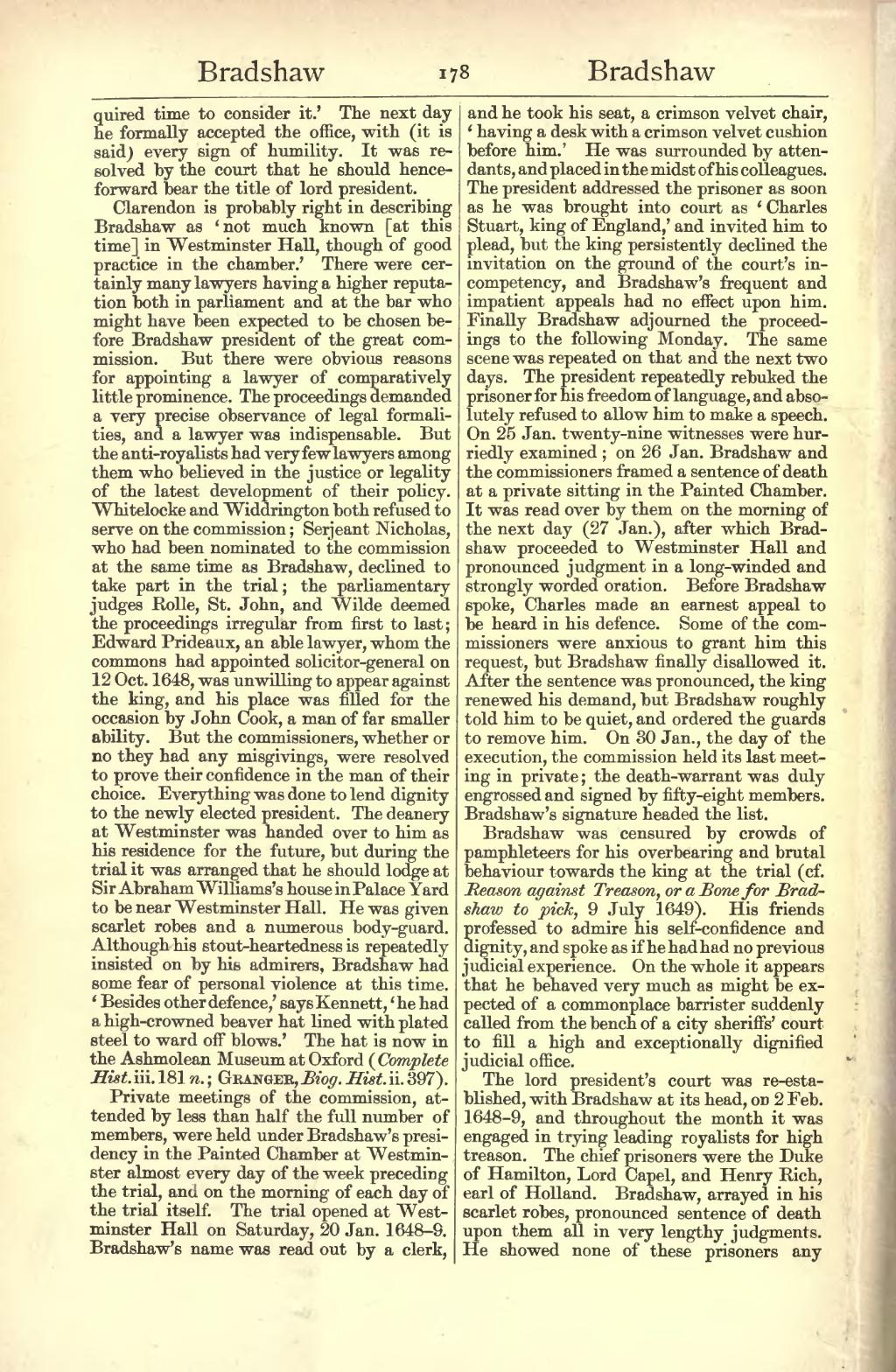quired time to consider it.' The next day he formally accepted the office, with (it is said) every sign of humility. It was resolved by the court that he should henceforward bear the title of lord president.
Clarendon is probably right in describing Bradshaw as 'not much known in Westminster Hall, though of good practice in the chamber.' There were certainly many lawyers having a higher reputation both in parliament and at the bar who might have been expected to be chosen before Bradshaw president of the great commission. But there were obvious reasons for appointing a lawyer of comparatively little prominence. The proceedings demanded a very precise observance of legal formalities, and a lawyer was indispensable. But the anti-royalists had very few lawyers among them who believed in the justice or legality of the latest development of their policy. Whitelocke and Widdrington both refused to serve on the commission; Serjeant Nicholas, who had been nominated to the commission at the same time as Bradshaw, declined to take part in the trial; the parliamentary judges Rolle, St. John, and Wilde deemed the proceedings irregular from first to last; Edward Prideaux, an able lawyer, whom the commons had appointed solicitor-general on 12 Oct. 1648, was unwilling to appear against the king, and his place was filled for the occasion by John Cook, a man of far smaller ability. But the commissioners, whether or no they had any misgivings, were resolved to prove their confidence in the man of their choice. Everything was done to lend dignity to the newly elected president. The deanery at Westminster was handed over to him as his residence for the future, but during the trial it was arranged that he should lodge at Sir Abraham Williams's house in Palace Yard to be near Westminster Hall. He was given scarlet robes and a numerous body-guard. Although his stout-heartedness is repeatedly insisted on by his admirers, Bradshaw had some fear of personal violence at this time. 'Besides other defence,' says Kennett, 'he had a high-crowned beaver hat lined with plated steel to ward off blows.' The hat is now in the Ashmolean Museum at Oxford (Complete Hist. iii. 181 n.; Granger, Biog. Hist. ii. 397).
Private meetings of the commission, attended by less than half the full number of members, were held under Bradshaw's presidency in the Painted Chamber at Westminster almost every day of the week preceding the trial, and on the morning of each day of the trial itself. The trial opened at Westminster Hall on Saturday, 20 Jan. 1648-9. Bradshaw's name was read out by a clerk, and he took his seat, a crimson velvet chair, 'having a desk with a crimson velvet cushion before him.' He was surrounded by attendants, and placed in the midst of his colleagues. The president addressed the prisoner as soon as he was brought into court as 'Charles Stuart, king of England,' and invited him to plead, but the king persistently declined the invitation on the ground of the court's incompetency, and Bradshaw's frequent and impatient appeals had no effect upon him. Finally Bradshaw adjourned the proceedings to the following Monday. The same scene was repeated on that and the next two days. The president repeatedly rebuked the prisoner for his freedom of language, and absolutely refused to allow him to make a speech. On 25 Jan. twenty-nine witnesses were hurriedly examined; on 26 Jan. Bradshaw and the commissioners framed a sentence of death at a private sitting in the Painted Chamber. It was read over by them on the morning of the next day (27 Jan.), after which Bradshaw proceeded to Westminster Hall and pronounced judgment in a long-winded and strongly worded oration. Before Bradshaw spoke, Charles made an earnest appeal to be heard in his defence. Some of the commissioners were anxious to grant him this request, but Bradshaw finally disallowed it. After the sentence was pronounced, the king renewed his demand, but Bradshaw roughly told him to be quiet, and ordered the guards to remove him. On 30 Jan., the day of the execution, the commission held its last meeting in private; the death-warrant was duly engrossed and signed by fifty-eight members. Bradshaw's signature headed the list.
Bradshaw was censured by crowds of pamphleteers for his overbearing and brutal behaviour towards the king at the trial (cf. Reason against Treason, or a Bone for Bradshaw to pick, 9 July 1649). His friends professed to admire his self-confidence and dignity, and spoke as if he had had no previous judicial experience. On the whole it appears that he behaved very much as might be expected of a commonplace barrister suddenly called from the bench of a city sheriffs' court to fill a high and exceptionally dignified judicial office.
The lord president's court was re-established, with Bradshaw at its head, on 2 Feb. 1648-9, and throughout the month it was engaged in trying leading royalists for high treason. The chief prisoners were the Duke of Hamilton, Lord Capel, and Henry Rich, earl of Holland. Bradshaw, arrayed in his scarlet robes, pronounced sentence of death upon them all in very lengthy judgments. He showed none of these prisoners any
